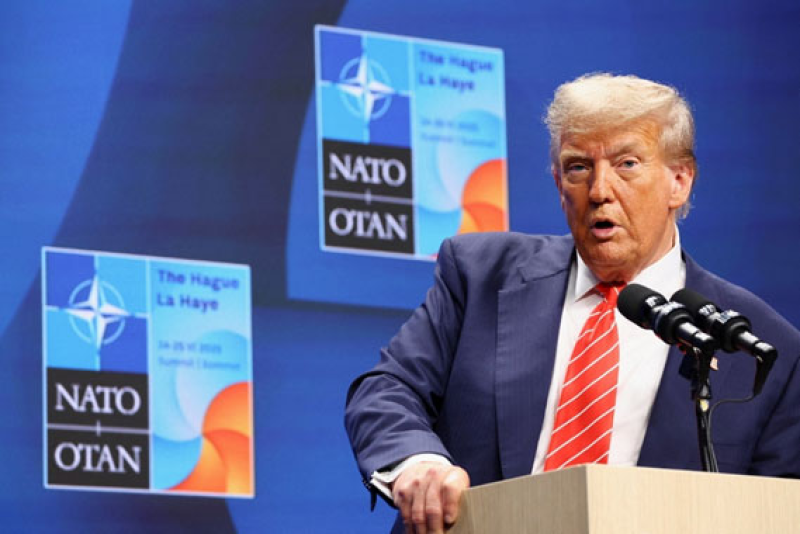- UN Pledges Support After Deadly Nepal Protests |
- 19 dead in Nepal as Gen Z protests at graft, social media ban |
- Nepal Police fire on protesters outside parliament, killing 10 |
- DUCSU 2025 Election's Digital Mirage |
- Houthi drone hits Israeli airport as Gaza City attacks mount |
NATO’s $1tn Defence Push Risks Transparency Crisis

Credit: Piroschka Van De Wouw
Donald Trump’s bullying tactics ahead of NATO’s annual summit, held in The Hague in June, worked spectacularly. By threatening to redefine NATO’s Article 5—the collective defence provision that has anchored Western security since 1949—Trump won commitments from NATO allies to almost triple their defence spending to five per cent of GDP by 2035. European defence budgets will balloon from around US$500 billion to over US$1 trillion annually, essentially matching US spending levels.
This is a staggering shift. Some NATO members currently spend around 1.2 per cent of GDP on traditional defence items, making the leap to five per cent an extraordinary proposition. The UK alone is earmarking US$1.3 billion to restore tactical nuclear capabilities, while the European Union (EU) has approved a US$176 billion fund for joint defence projects. Member states will even be allowed to breach normal debt limits without penalty—a clear signal that defence spending now trumps all other priorities.
At a time when people across NATO countries struggle with living costs and feel public services have been cut to the bone, this remilitarisation threatens deeper economic insecurity. More military spending may mean less funding for education, healthcare, and programmes supporting those most in need. The UK has already announced cuts to international aid, which just a few years ago stood at 0.7 per cent of gross national income, reducing it to 0.3 per cent by 2027 to pay for defence—with other countries following suit. The result will be a massive transfer of income from the world’s poorest people to politically powerful defence corporations, mostly based in the USA.
A further alarming aspect of NATO’s spending surge is what it lacks: meaningful transparency requirements or standardised oversight mechanisms. Defence procurement typically operates behind closed doors, so normal accountability rules don’t apply. Decisions are shrouded in secrecy, complex international supply chains make oversight harder, and industry-government relationships blur ethical lines. The revolving door between officials and contractors compromises independent decision-making, while national security provides convenient cover for decisions that might not withstand public scrutiny.
Rapid spending increases will exacerbate these accountability problems. The pandemic showed that sudden shifts in state spending are rarely transparent and often provide opportunities for corruption. As governments race to meet deadlines—and pressure from Trump mounts to show immediate results—expedited procurement processes are likely to bypass normal checks and balances.
History offers sobering lessons. In Afghanistan, billions meant to develop local defence capacity disappeared into ghost projects and phantom battalions. Corruption undermined military effectiveness by producing substandard equipment and compromising logistics networks, helping enable the Taliban’s rapid return to power. Ukraine’s experience provides another cautionary tale: despite intense international scrutiny since Russia’s invasion, it took years to root out corrupt networks that had captured large portions of the defence budget.
Meanwhile, Russia has spent decades honing its malign influence operations, using cash and networks of cronies to hollow out democratic processes in Western states, including many NATO members. A defence spending boom with no accountability safeguards risks creating fresh vulnerabilities that authoritarian states and organised criminal groups can exploit.
The solution is to democratise defence spending. Recent research on EU defence procurement reveals that more transparent military contracting consistently produces lower corruption levels. Countries with greater transparency spend money more efficiently, with fewer cost overruns and higher-quality equipment.
One of the most glaring gaps in NATO’s current approach is the absence of civil society from defence governance. Other government ministries routinely consult with civil society, but defence ministries make major spending decisions with minimal input from those who can ensure choices reflect real human security needs and democratic values.
Civil society organisations bring crucial capabilities governments often lack: the independence to ask difficult questions, the expertise to spot red flags in complex contracts, and the persistence to follow money trails to politically sensitive destinations. Security encompasses more than troops and weapons—it includes building institutional resilience, defusing disinformation, and strengthening democratic systems against attack, areas where civil society has much to contribute.
Effective oversight doesn’t mean revealing sensitive operational details or compromising security. It requires tracking financial flows, monitoring contractor performance, and ensuring competitive bidding processes. Civil society groups have repeatedly demonstrated they can investigate defence spending without endangering national security.
Before the money starts flowing, NATO should establish a defence procurement transparency initiative that sets baseline standards for member states. This should include requirements for public disclosure of contract values and vendor selection criteria, covering procurement, exports, offset agreements, and spending on AI, cyber capabilities, and research and development. National parliaments must be empowered to scrutinise decisions, independent oversight bodies should be adequately resourced to follow the money, and both should draw on civil society expertise.
Civil society needs to be protected and allowed access to monitor defence spending flows, and whistleblower protections for defence sector employees should be strengthened. As civil society organisations worldwide endure funding cuts—including because of the Trump administration’s evisceration of aid spending—any increase in defence spending mustn’t come at the cost of democracy and human rights.
NATO’s credibility, and ultimately its security, depends on reconciling human security with respect for democratic values. That will only be achieved if civil society is able to play its role.

